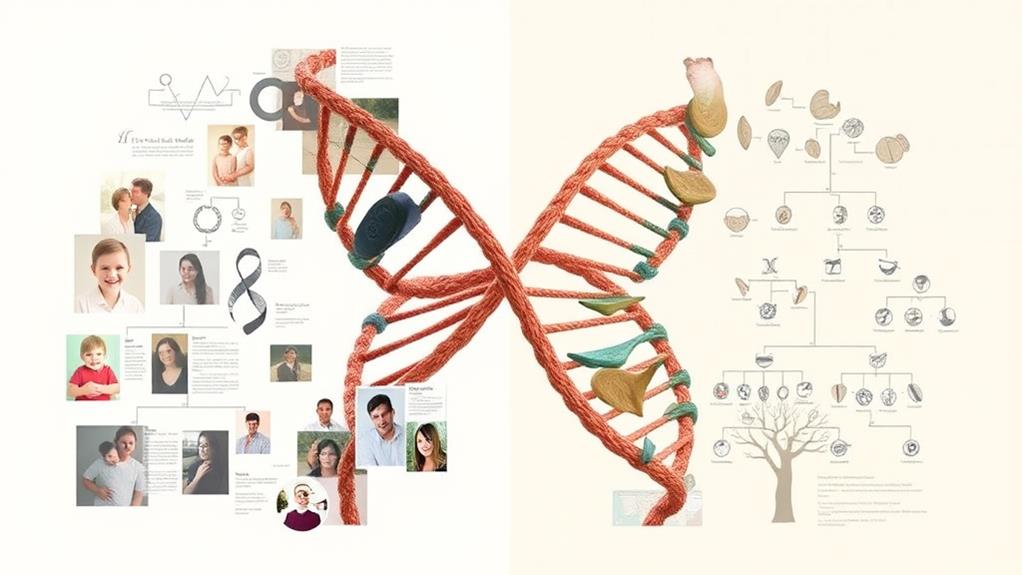If you're considering the possibility of conceiving twins, there are several important factors you should think about. Your age, family history, and even your diet can play significant roles in increasing your chances. For instance, women over 30 often have a higher likelihood of releasing multiple eggs, while certain dietary choices might enhance reproductive health. Exploring fertility treatments can also be an option worth considering. But what other lifestyle factors could influence your journey to twins? The answer may surprise you.
Understanding Genetics

When it comes to conceiving twins, understanding genetics is crucial. You might be wondering why some families have twins while others don't. The answer often lies in genetics. If you have a family history of twins, especially on your mother's side, your chances of having twins increase. This is because the likelihood of releasing more than one egg during ovulation can be inherited.
There are two types of twins: identical and fraternal. Identical twins occur when a single fertilized egg splits into two embryos. This isn't influenced by genetics—it's more of a random event.
On the other hand, fraternal twins happen when two separate eggs are fertilized at the same time. This type can be affected by genetics, meaning if your family has a history of fraternal twins, your odds might be higher.
Age also plays a role in genetics. Women over 30 tend to release more eggs, increasing their chances of having twins.
While you can't control your genetic makeup, knowing these factors can help you understand your own chances of conceiving twins. So, if you're dreaming of double trouble, genetics is definitely a key player!
Dietary Influences
Your diet can significantly impact your chances of conceiving twins. Research shows that certain foods and nutrients may play a role in increasing your likelihood of having multiples.
For instance, consuming dairy products could be beneficial. Studies suggest that women who eat more dairy have a higher chance of conceiving twins, possibly due to certain hormones found in milk.
Incorporating folic acid into your diet is also essential. This nutrient, found in leafy greens, beans, and fortified cereals, is crucial for overall reproductive health. It might help create a more favorable environment for multiple pregnancies.
Additionally, consider protein-rich foods. Eating more eggs, fish, and lean meats can provide your body with the nutrients it needs to support a twin pregnancy.
Some studies indicate that a higher protein intake may be linked to an increased chance of twins.
Fertility Treatments Options

Fertility treatments can significantly enhance your chances of conceiving twins. If you're considering this journey, there are several options available that you should know about.
First, medications like Clomid or gonadotropins can stimulate your ovaries, encouraging the release of multiple eggs during ovulation. This can lead to a higher chance of twins.
In vitro fertilization (IVF) is another popular method. During IVF, doctors can transfer multiple embryos into your uterus, increasing the likelihood of multiple pregnancies.
Additionally, some clinics may even recommend using a combination of medications and IVF for optimal results.
Another option is the use of fertility supplements, which some believe may promote twin conception. However, it's essential to consult a healthcare provider to ensure safety and effectiveness.
Lastly, speaking with a fertility specialist can provide you with tailored advice based on your unique situation. They can guide you through the various treatments and help you understand the potential risks and benefits.
Age and Twin Conception
Research shows that age plays a significant role in the likelihood of conceiving twins. If you're a woman in your late 30s or early 40s, you might've a higher chance of having twins compared to younger women. This is because as women age, their bodies tend to release more than one egg during ovulation. This process increases the chances of having fraternal twins.
Additionally, women who are over 35 often experience hormonal changes that can lead to multiple ovulations. This means that if you're in this age range and are considering starting a family, your odds of having twins could be better than you think.
However, it's essential to remember that while age can influence twin conception, it's just one factor among many. Genetics, family history, and certain fertility treatments also play a part.
Lifestyle Factors to Consider

When it comes to conceiving twins, several lifestyle factors can significantly impact your chances. First, consider your diet. Eating a balanced diet rich in fruits, vegetables, and whole grains can help your body maintain a healthy weight, which is important.
Some studies suggest that women who consume dairy products may have a higher chance of conceiving twins, so including those in your meals might be beneficial.
Next, focus on maintaining a healthy body weight. Women with a higher body mass index (BMI) might've an increased likelihood of having twins. However, it's essential to approach weight management in a healthy way, avoiding drastic diets.
Another factor to consider is your family history. If you have a family background of twins, your chances may be higher. Additionally, certain lifestyle choices, like reducing stress and getting enough sleep, can improve overall fertility.
Lastly, consider your exercise routine. Regular, moderate exercise can enhance your reproductive health but avoid over-exercising, as that may have the opposite effect.
